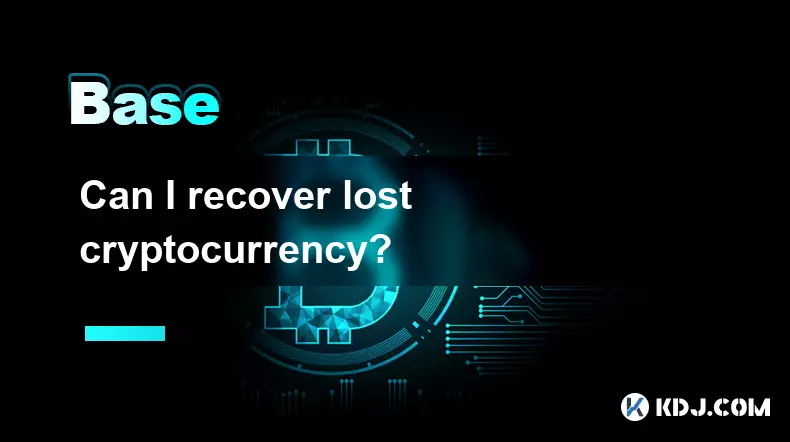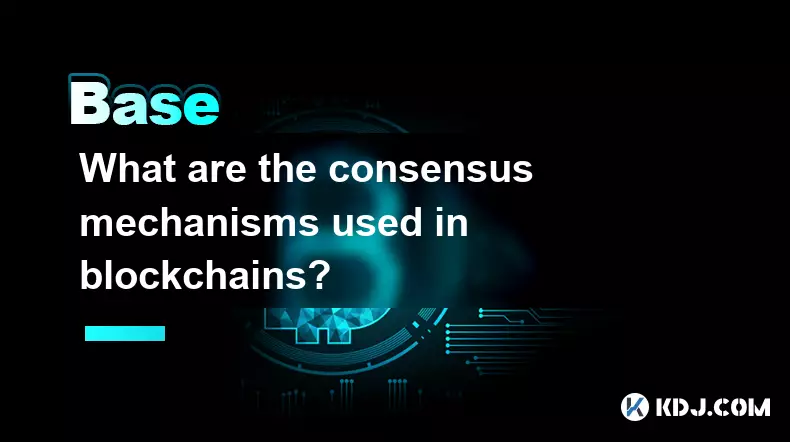-
 bitcoin
bitcoin $109667.069529 USD
-3.03% -
 ethereum
ethereum $3936.685804 USD
-4.07% -
 tether
tether $1.000493 USD
0.01% -
 xrp
xrp $2.771823 USD
-4.74% -
 bnb
bnb $957.805027 USD
-5.34% -
 solana
solana $196.735100 USD
-6.68% -
 usd-coin
usd-coin $0.999727 USD
-0.01% -
 dogecoin
dogecoin $0.227355 USD
-5.12% -
 tron
tron $0.335205 USD
-0.81% -
 cardano
cardano $0.779256 USD
-3.59% -
 ethena-usde
ethena-usde $0.999900 USD
-0.06% -
 hyperliquid
hyperliquid $42.492095 USD
-6.61% -
 chainlink
chainlink $20.501853 USD
-4.34% -
 avalanche
avalanche $28.952606 USD
-11.21% -
 stellar
stellar $0.356038 USD
-3.93%
Can I recover lost cryptocurrency?
Cryptocurrency loss is often permanent due to decentralized, immutable blockchains—users must safeguard keys and wallets, as no central authority can reverse transactions or recover funds.
Sep 25, 2025 at 08:18 am

Understanding the Nature of Cryptocurrency Loss
1. Cryptocurrency operates on decentralized networks, meaning there is no central authority to reverse transactions or restore lost funds. Once digital assets are sent to an incorrect address or misplaced due to user error, recovery becomes extremely difficult.
2. The most common causes of loss include forgotten private keys, compromised wallets, accidental transfers, and hardware failures. Each scenario presents unique challenges because blockchain transactions are immutable by design.
3. Unlike traditional banking systems, where institutions can intervene in cases of fraud or error, cryptocurrency users bear full responsibility for securing their assets. This self-custody model empowers individuals but also increases the risk of permanent loss if proper precautions aren’t taken.
4. Estimates suggest that millions of bitcoins have already been permanently lost due to inaccessible wallets and unrecoverable keys. This scarcity indirectly affects market dynamics by reducing the circulating supply over time.
Recovery Options Based on Loss Type
1. If a user has lost access to a wallet but retains the seed phrase or private key, restoration is possible through compatible wallet software. Most modern wallets support recovery via a 12- or 24-word mnemonic phrase, allowing users to regenerate their account on a new device.
2. In cases where the private key is completely lost and no backup exists, recovery is generally not feasible. Blockchain technology does not allow for password resets or account recovery mechanisms like those found in conventional online services.
3. For hardware wallet malfunctions, contacting the manufacturer may help if the device is under warranty or if they offer data retrieval tools. However, reputable manufacturers do not store user keys and thus cannot directly restore access without the original credentials.
4. When funds are sent to an incorrect address—especially one that is inactive or non-existent—the transaction cannot be reversed. Some blockchain explorers allow tracking of such transactions, but no network-level mechanism enables fund retrieval once confirmed.
Security Practices to Prevent Future Loss
1. Always write down and securely store your seed phrase offline. Avoid digital storage methods such as screenshots, emails, or cloud notes, which are vulnerable to hacking and data breaches.
2. Use trusted wallet providers with strong reputations and open-source codebases. Verify download sources to avoid counterfeit applications designed to steal credentials.
3. Enable multi-signature setups for high-value holdings. These require multiple approvals before transactions can be executed, adding layers of protection against unauthorized access.
4. Regularly test your backup by restoring the wallet on a separate device. This ensures that your recovery method works before an actual emergency occurs.
5. Never share your private key or seed phrase with anyone, regardless of who claims to assist you. Legitimate organizations will never ask for this information.
Scams Targeting Users Seeking Recovery
1. Many fraudulent actors exploit desperation by promising to recover lost crypto for a fee. These scams often involve fake recovery services, phishing websites, or impersonation of well-known blockchain experts.
2. Victims may be asked to provide their seed phrase under the guise of 'verification,' resulting in immediate theft of remaining assets. No legitimate service requires full access to your keys.
3. Some attackers use social engineering tactics on forums and support channels, posing as helpful community members. They gain trust before requesting sensitive information or directing users to malicious platforms.
4. Be skeptical of any individual or platform offering guaranteed recovery solutions. If it sounds too good to be true, it almost certainly is.
Frequently Asked Questions
Can a blockchain explorer help me get my crypto back?A blockchain explorer allows you to track transaction history and verify whether funds reached a specific address. However, it does not grant the ability to reverse or reclaim tokens. It serves only as a transparent ledger, not a recovery tool.
What should I do if I sent crypto to the wrong network?Sending assets to an incompatible network (e.g., sending ERC-20 tokens to a BEP-2 address) often results in permanent loss unless the receiving wallet supports both chains. Contacting the wallet provider might yield assistance if cross-chain recovery is technically possible.
Is there any legal recourse after losing cryptocurrency?Legal systems currently lack standardized frameworks for recovering lost digital assets. Courts typically do not intervene in cases involving user error or lost keys, especially when no third-party breach occurred. Jurisdictional challenges further complicate potential litigation.
Are there tools that claim to crack private keys?While theoretical brute-force attacks exist, the computational power required to guess a valid private key is astronomically high. Any tool claiming to “crack” keys is almost certainly a scam, preying on hope rather than delivering functional technology.
Disclaimer:info@kdj.com
The information provided is not trading advice. kdj.com does not assume any responsibility for any investments made based on the information provided in this article. Cryptocurrencies are highly volatile and it is highly recommended that you invest with caution after thorough research!
If you believe that the content used on this website infringes your copyright, please contact us immediately (info@kdj.com) and we will delete it promptly.
- BlockDAG's Miner Rollout: A Global Expansion Story
- 2025-09-26 14:45:12
- XPL Surge: Is It a Dead Cat Bounce or the Real Deal?
- 2025-09-26 14:45:12
- XRP, Axelar, and Interchain Transfers: A New Era for DeFi?
- 2025-09-26 14:25:13
- Epstein Files, Antonio Brown, and Trump: A Wild Intersection
- 2025-09-26 14:25:13
- Tech-Savvy Parents Face Unexpected Challenges: A Guide to Childproofing the Digital Age
- 2025-09-26 14:30:01
- Riding the XRP Wave: Debt Tokenization and the Next Bull Cycle
- 2025-09-26 14:30:01
Related knowledge

Can I recover lost cryptocurrency?
Sep 25,2025 at 08:18am
Understanding the Nature of Cryptocurrency Loss1. Cryptocurrency operates on decentralized networks, meaning there is no central authority to reverse ...

How can I earn passive income from cryptocurrency?
Sep 23,2025 at 10:18am
Staking Cryptocurrencies for Regular Returns1. Many blockchain networks operate on a proof-of-stake (PoS) consensus mechanism, allowing users to earn ...

What are gas fees in cryptocurrency transactions?
Sep 26,2025 at 02:00am
Understanding Gas Fees in Blockchain Transactions1. Gas fees are payments made by users to compensate for the computing energy required to process and...

What are the consensus mechanisms used in blockchains?
Sep 24,2025 at 10:00am
Proof of Work and Its Role in Blockchain Security1. Proof of Work (PoW) is one of the earliest consensus mechanisms, first implemented by Bitcoin. Min...

How do cryptocurrencies impact traditional finance?
Sep 26,2025 at 05:54am
Disruption of Centralized Banking Systems1. Cryptocurrencies challenge the authority of central banks by offering decentralized alternatives to fiat c...

Is there a finite supply of Bitcoin?
Sep 23,2025 at 06:00am
Bitcoin's Fixed Supply Mechanism1. Bitcoin was designed with a hard cap of 21 million coins, making its supply finite and predictable. This limit is h...

Can I recover lost cryptocurrency?
Sep 25,2025 at 08:18am
Understanding the Nature of Cryptocurrency Loss1. Cryptocurrency operates on decentralized networks, meaning there is no central authority to reverse ...

How can I earn passive income from cryptocurrency?
Sep 23,2025 at 10:18am
Staking Cryptocurrencies for Regular Returns1. Many blockchain networks operate on a proof-of-stake (PoS) consensus mechanism, allowing users to earn ...

What are gas fees in cryptocurrency transactions?
Sep 26,2025 at 02:00am
Understanding Gas Fees in Blockchain Transactions1. Gas fees are payments made by users to compensate for the computing energy required to process and...

What are the consensus mechanisms used in blockchains?
Sep 24,2025 at 10:00am
Proof of Work and Its Role in Blockchain Security1. Proof of Work (PoW) is one of the earliest consensus mechanisms, first implemented by Bitcoin. Min...

How do cryptocurrencies impact traditional finance?
Sep 26,2025 at 05:54am
Disruption of Centralized Banking Systems1. Cryptocurrencies challenge the authority of central banks by offering decentralized alternatives to fiat c...

Is there a finite supply of Bitcoin?
Sep 23,2025 at 06:00am
Bitcoin's Fixed Supply Mechanism1. Bitcoin was designed with a hard cap of 21 million coins, making its supply finite and predictable. This limit is h...
See all articles










































































